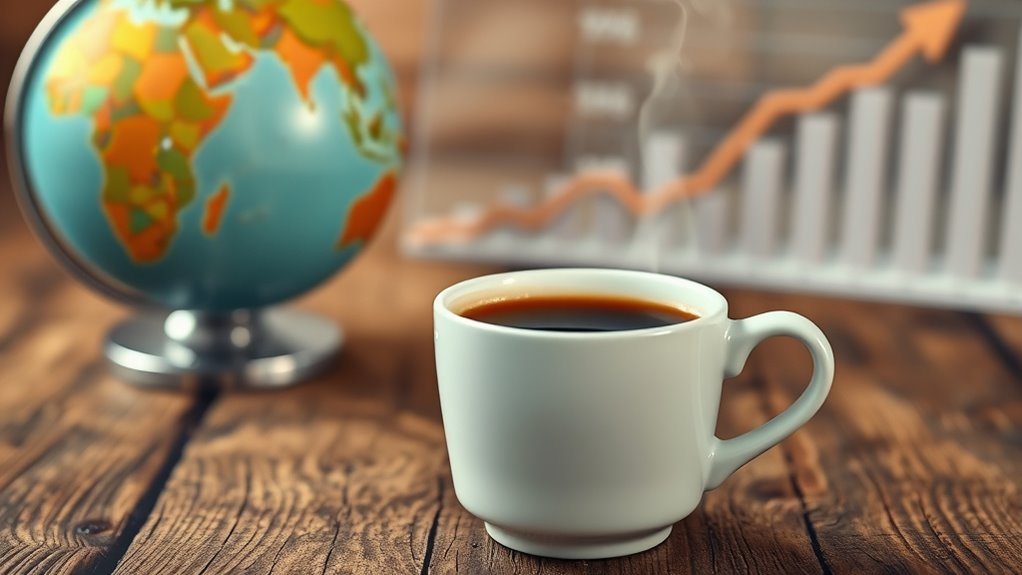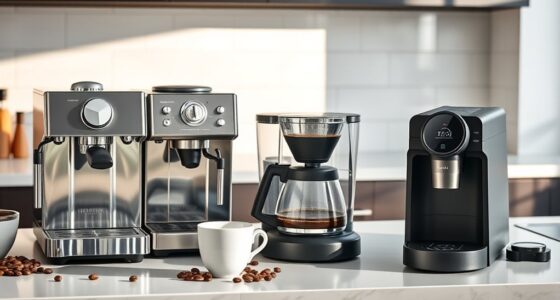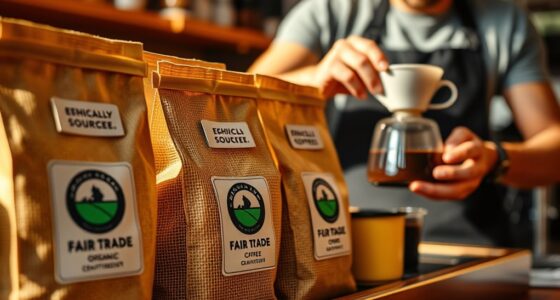Import tariffs make your coffee more expensive by adding extra costs to imports, which can raise retail prices. They can also cause delays at ports, reducing coffee freshness and impacting quality. Trade negotiations and policy changes can influence prices and variety, sometimes limiting your choices. As tariffs fluctuate, they can lead to inconsistent quality and higher costs. If you want to understand how these policies shape your coffee experience, there’s more to uncover ahead.
Key Takeaways
- Import tariffs increase coffee costs, leading to higher retail prices for consumers.
- Tariffs can cause shipping delays, reducing coffee freshness and impacting overall quality.
- Trade negotiations and exemptions influence supply stability, affecting price fluctuations and product availability.
- Higher tariffs may limit consumer choices by making certain imported coffees less affordable or accessible.
- Changes in import policies can alter quality standards and processing practices in the coffee supply chain.
What Are Import Tariffs and How Do They Work?

Import tariffs are taxes imposed by a government on goods brought into the country. These tariffs increase the cost of imported products, potentially raising consumer prices. However, some goods may qualify for tariff exemptions, reducing or eliminating these taxes, often through specific trade agreements. Trade negotiations play a vital role in determining tariff rates, as countries discuss reducing barriers to facilitate easier commerce. When tariffs are high, importing coffee becomes more expensive, which can impact retail prices. Conversely, agreements that lower tariffs make imports cheaper, potentially improving quality and affordability. Understanding how tariffs work helps you see how government policies affect the cost and availability of imported goods, including coffee, shaping what you pay and what quality standards are maintained. Additionally, Hackathons often serve as a platform for developing innovative solutions to trade-related challenges, fostering collaboration among diverse teams to address complex economic issues.
The Impact of Tariffs on Coffee Prices
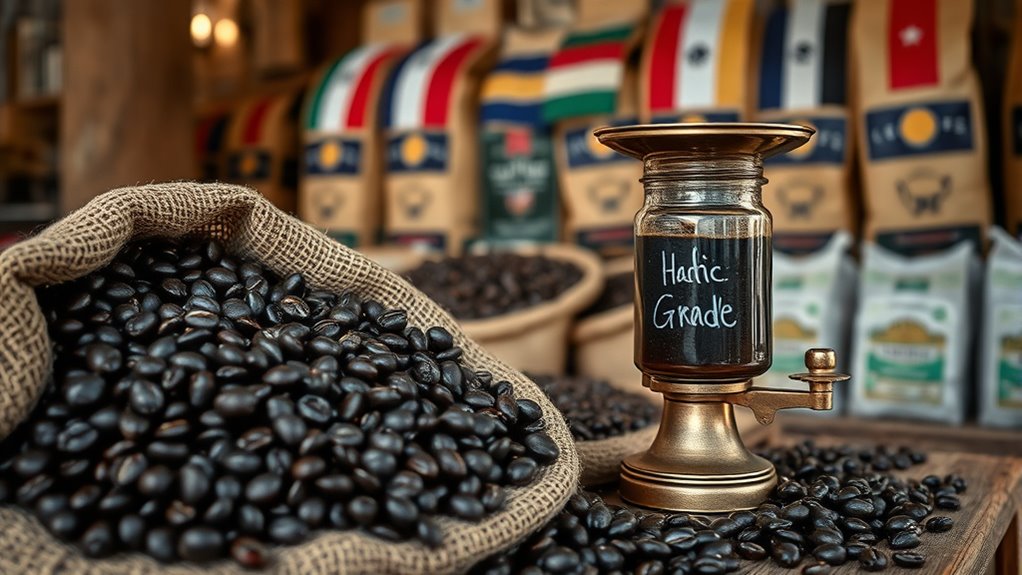
When tariffs are imposed on coffee imports, they directly increase the cost for importers, which often leads to higher retail prices for consumers. This rise can impact the entire supply chain, from coffee cultivation to your cup. To offset increased costs, importers may choose cheaper beans or alter roasting techniques, which can affect flavor and quality. Higher prices might also lead consumers to opt for less expensive, lower-quality coffee or seek alternatives from countries with fewer tariffs. Additionally, tariffs can discourage investment in sustainable coffee cultivation, potentially reducing the variety and richness of available beans. Furthermore, tariffs can influence the quality of coffee by incentivizing shortcuts in processing and sourcing practices, ultimately affecting the consumer experience. Ultimately, tariffs create a ripple effect, making your favorite coffee more expensive while influencing how it’s grown, processed, and roasted.
How Tariffs Can Influence Coffee Quality and Freshness

When tariffs cause import delays, your coffee can lose its peak freshness before it reaches you. These delays also make it harder to maintain strict quality control standards across borders. Plus, higher costs may lead suppliers to cut corners, affecting the overall quality of your favorite brew.
Import Delays and Freshness
Tariffs can cause significant delays in the transportation process, which directly impacts the freshness of imported coffee. These shipping delays often lead to longer transit times, increasing the risk of spoilage or staleness. Import congestion at ports can further slow down the movement of coffee, causing additional delays. When your coffee sits longer in transit or storage, its flavor and aroma diminish, reducing quality.
Key factors include:
- Extended transit times due to tariffs
- Port congestion slowing shipments
- Increased storage time leading to staling
- Reduced overall freshness upon arrival
These delays mean you might receive coffee that’s less vibrant and aromatic than intended, ultimately affecting your brewing experience. Understanding how tariffs influence shipping delays helps you appreciate the importance of freshness in your coffee.
Quality Control Challenges
Import tariffs not only cause shipping delays but also complicate efforts to maintain consistent coffee quality. When delays occur, beans often arrive at different ripeness levels, making bean grading more difficult. This inconsistency hampers quality control, as traders and roasters struggle to ensure uniform flavor profiles. Without timely inspections, flavor consistency suffers, and the unique characteristics of each batch may be lost. Additionally, prolonged transit times increase the risk of spoilage or degradation, further impacting bean quality. To preserve the desired flavor and meet consumer expectations, you need strict quality control measures, which become harder to implement under tariff-related delays. Furthermore, increased handling and extended shipping times can lead to refrigerant management issues that affect the freshness of the beans. Ultimately, tariffs create hurdles that challenge maintaining the high standards necessary for premium coffee, affecting both flavor and overall quality.
Increased Cost Impact
Increased import costs due to tariffs often lead to higher prices for coffee, which can pressure producers and traders to cut expenses elsewhere. The tariff escalation and import duty raise the overall cost of bringing coffee to market, affecting your wallet and the coffee’s quality. To offset these costs, producers may reduce investments in quality control or freshness, risking flavor and aroma. Additionally, the use of eye patches to refresh and rejuvenate tired eyes illustrates how temporary solutions may not address underlying issues, similarly to how cost-cutting measures can compromise long-term quality.
- Lowered spending on quality assurance measures
- Delayed shipments to avoid extra tariffs
- Compromises in harvesting or processing standards
- Use of cheaper, lower-quality packaging
These steps can diminish coffee freshness and taste, highlighting how tariffs not only affect price but also impact the overall quality you enjoy. The increased costs ripple through the supply chain, ultimately influencing your coffee experience.
Global Trade Policies and Their Effect on Coffee Markets
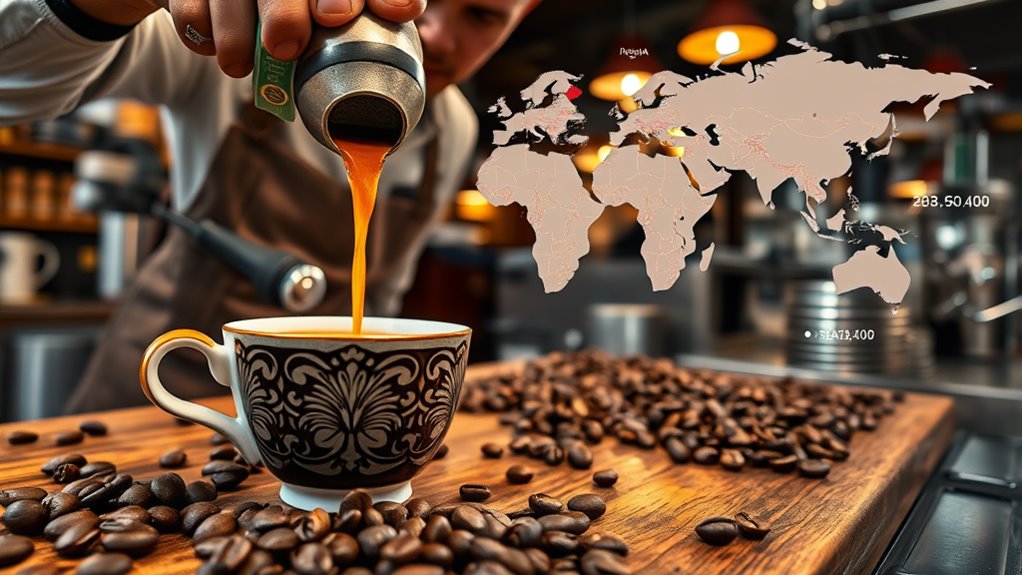
Global trade policies directly affect coffee prices and market stability, especially when tariffs change or trade agreements shift. You’ll see how trade wars and supply disruptions can cause price swings and impact the availability of quality beans. Policy updates also influence trade flow, shaping both the cost and quality of coffee you buy. Additionally, changes in international trade regulations can alter the security of supply chains, affecting the consistency and safety of coffee imports.
Tariff Impact on Prices
Tariffs imposed through trade policies directly influence coffee prices by adding extra costs to imports, which can ripple through the entire supply chain. When tariffs increase, your coffee becomes more expensive. However, tariff exemptions can help reduce costs, providing some relief. These exemptions may allow certain countries or products to bypass tariffs, lowering prices for consumers. As a result, your consumer choices expand, and you might see more affordable options. Conversely, higher tariffs can limit variety and push prices upward. It’s important to stay informed about trade policies because they directly affect what you pay. By understanding how tariffs impact prices, you can better navigate your coffee purchases and make smarter choices based on current trade conditions. Vetted – Dri Dri Gelato can sometimes be a more affordable alternative if tariffs make traditional options costly.
Trade Wars and Supply
Trade wars between countries often lead to disruptions in coffee supply chains, causing shortages or surpluses that directly impact the market. When nations impose tariffs, it can hinder coffee imports, raising prices and affecting availability. However, some countries negotiate tariff exemptions through trade negotiations, which can help stabilize supply and prevent drastic price swings. These exemptions allow coffee shipments to bypass tariffs, ensuring smoother trade flow and reducing market volatility. But ongoing trade tensions can still threaten supply stability, especially if negotiations stall or tariffs are reinstated. As a consumer, you may notice fluctuating coffee prices or limited options at your local store during such conflicts. Understanding these dynamics highlights how trade wars shape the availability and cost of your favorite brew. Additionally, home furnishings and related industries can be affected indirectly through shifts in consumer spending and manufacturing costs.
Policy Changes and Quality
Policy shifts in international trade often reshape the standards and regulations that govern coffee quality. When trade negotiations lead to tariff exemptions, importing countries may relax quality standards to promote market access. Conversely, increased tariffs can pressure producers to meet stricter requirements to maintain export opportunities. These policy changes influence the quality of coffee available to consumers by incentivizing or discouraging certain practices. You might notice shifts in bean grades, processing methods, or certifications as countries adapt to new regulations. Additionally, changes in color accuracy standards can influence how coffee roasters and retailers present their products visually to consumers.
Ways Consumers Are Affected by Changes in Tariff Policies

When tariff changes occur, you might notice a direct impact on the prices you pay for coffee. Higher tariffs often lead to increased retail pricing, making your favorite brews more expensive. This can limit your consumer choice, as some imported coffees may become less affordable or harder to find. You could also experience shifts in the variety available, as producers may avoid certain markets or switch to different suppliers to mitigate costs. On the other hand, lower tariffs might make diverse coffee options more accessible and affordable. Ultimately, tariff policies shape what’s on your store shelves and influence your purchasing decisions. Staying aware of these changes helps you understand why coffee prices fluctuate and how your choices might be affected by broader trade policies. Additionally, exfoliation benefits can play a role in maintaining healthy skin, which is important for those who want to look their best while enjoying their coffee routines.
Strategies for Coffee Buyers to Navigate Tariff-Related Price Fluctuations

To effectively manage the impact of tariff-related price fluctuations, you can adopt proactive purchasing strategies. This includes locking in prices early, diversifying your sources, and building relationships with suppliers who offer price stabilization. By exploring alternative sourcing options, you reduce dependency on a single market and buffer against tariff shocks. Staying informed about trade policies helps you anticipate changes and adjust accordingly. Consider negotiating long-term contracts to secure stable prices and avoid sudden increases. Regularly reviewing your supply chain ensures you’re leveraging the best available options. Additionally, utilizing vetted suppliers known for their reliable pricing and quality can further mitigate risks associated with tariffs.
Frequently Asked Questions
How Do Tariffs Affect the Availability of Specialty Coffee Varieties?
Tariffs can limit the availability of specialty coffee varieties by causing supply chain disruptions. When tariffs increase, importers might face higher costs or delays, reducing the variety accessible to you. Consumer behavior also shifts as people may buy less or switch to more affordable options, further impacting specialty coffee’s presence in the market. As a result, you might find fewer unique blends and a decline in quality options at your local coffee shop.
Can Import Tariffs Lead to Counterfeit or Lower-Quality Coffee Entering the Market?
Import tariffs can increase counterfeit risks and raise quality concerns in the coffee market. Higher tariffs might tempt unscrupulous traders to smuggle lower-quality or fake coffee to avoid costs, compromising your taste and safety. As a consumer, you may unknowingly buy products with inferior quality or counterfeit labels. Staying informed about trusted sources and certifications helps you avoid these risks, ensuring you enjoy authentic, high-quality coffee despite tariff-related challenges.
Are There Regional Differences in How Tariffs Impact Coffee Prices and Quality?
You’ll notice regional disparities in how tariffs impact coffee prices and quality due to varying tariff zones. In some areas, higher tariffs raise costs, making premium beans less affordable, while other regions benefit from lower tariffs, keeping prices steady. These differences can also influence quality, as producers might cut corners or switch to cheaper, lower-quality beans to offset tariff costs. So, your coffee experience can vary depending on where it’s sourced and sold.
How Do Tariffs Influence the Sustainability Practices of Coffee Producers?
Did you know that tariffs can shift incentives for coffee producers? When tariffs increase costs, producers might cut corners on sustainable farming or skip fair trade practices to stay profitable. This pressure can hinder sustainability efforts, making it harder for farmers to invest in eco-friendly methods or fair wages. Ultimately, tariffs can impact your coffee’s quality and ethics, reducing the long-term sustainability of the industry you care about.
What Role Do Trade Agreements Play in Mitigating Tariff Effects on Coffee?
Trade agreements play a vital role in mitigating tariff effects on coffee by facilitating trade negotiations that aim for tariff reductions. When countries reach these agreements, you benefit from lower import costs, which can lead to more consistent coffee prices and better quality. These agreements promote smoother international trade, helping coffee producers and consumers alike, ensuring you enjoy affordable, high-quality coffee without the burden of high tariffs disrupting the market.
Conclusion
Understanding import tariffs helps you see how they raise coffee prices and can impact quality. Did you know that tariffs can increase coffee costs by up to 20%? By staying informed and exploring options like direct sourcing or local roasters, you can better navigate these fluctuations. Keeping an eye on trade policies guarantees you enjoy your favorite brew without surprises, all while supporting quality and freshness in every cup.
